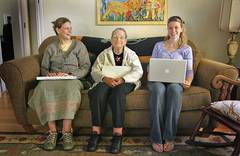
What happens to our cognitive abilities as we age?
If your think our brains go into a steady decline, research reported this week in the Journal Topics in Cognitive Science may make you think again. The work, headed by Dr. Michael Ramscar of Tübingen University, takes a critical look at the measures usually thought to show that our cognitive abilities decline across adulthood. Instead of finding evidence of decline, the team discovered that most standard cognitive measures, which date back to the early twentieth century, are flawed. “The human brain works slower in old age,” says Ramscar, “but only because we have stored more information over time.”
Computers were trained, like humans, to read a certain amount each day, and to learn new things. When the researchers let a computer “read” only so much, its performance on cognitive tests resembled that of a young adult. But if the same computer was exposed to the experiences we might encounter over a lifetime – with reading simulated over decades – its performance now looked like that of an older adult. Often it was slower, but not because its processing capacity had declined. Rather, increased “experience” had caused the computer’s database to grow, giving it more data to process – which takes time.
Technology now allows researchers to make quantitative estimates of the number of words an adult can be expected to learn across a lifetime, enabling the Tübingen team to separate the challenge that increasing knowledge poses to memory from the actual performance of memory itself. “Imagine someone who knows two people’s birthdays and can recall them almost perfectly. Would you really want to say that person has a better memory than a person who knows the birthdays of 2000 people, but can ‘only’ match the right person to the right birthday nine times out of ten?” asks Ramscar.
The answer appears to be “no.” When Ramscar’s team trained their computer models on huge linguistic datasets, they found that standardized vocabulary tests, which are used to take account of the growth of knowledge in studies of ageing, massively underestimate the size of adult vocabularies. It takes computers longer to search databases of words as their sizes grow, which is hardly surprising but may have important implications for our understanding of age-related slowdowns. The researchers found that to get their computers to replicate human performance in word recognition tests across adulthood, they had to keep their capacities the same. “Forget about forgetting,” explained Tübingen researcher Peter Hendrix, “if I wanted to get the computer to look like an older adult, I had to keep all the words it learned in memory and let them compete for attention.”
The research shows that studies of the problems older people have with recalling names suffer from a similar blind spot: there is a far greater variety of given names today than there were two generations ago. This cultural shift toward greater name diversity means the number of different names anyone learns over their lifetime has increased dramatically. The work shows how this makes locating a name in memory far harder than it used to be. Even for computers.
Ramscar and his colleagues’ work provides more than an explanation of why, in the light of all the extra information they have to process, we might expect older brains to seem slower and more forgetful than younger brains. Their work also shows how changes in test performance that have been taken as evidence for declining cognitive abilities in fact demonstrates older adults’ greater mastery of the knowledge they have acquired.
Take “paired-associate learning,” a commonly used cognitive test that involves learning to connect words like “up” to “down” or “necktie” to “cracker” in memory. Using Big Data sets to quantify how often different words appear together in English, the Tuebingen team show that younger adults do better when asked to learn to pair “up” with “down” than “necktie” and “cracker” because “up” and “down” appear in close proximity to one another more frequently. However, whereas older adults also understand which words don’t usually go together, young adults notice this less. When the researchers examined performance on this test across a range of word pairs that go together more and less in English, they found older adult’s scores to be far more closely attuned to the actual information in hundreds of millions of words of English than their younger counterparts.
As Prof. Harald Baayen, who heads the Alexander von Humboldt Quantitative Linguistics research group where the work was carried out puts it, “If you think linguistic skill involves something like being able to choose one word given another, younger adults seem to do better in this task. But, of course, proper understanding of language involves more than this. You have also to not put plausible but wrong pairs of words together. The fact that older adults find nonsense pairs – but not connected pairs – harder to learn than young adults simply demonstrates older adults’ much better understanding of language. They have to make more of an effort to learn unrelated word pairs because, unlike the youngsters, they know a lot about which words don’t belong together.”
The Tübingen research conclude that we need different tests for the cognitive abilities of older people – taking into account the nature and amount of information our brains process. “The brains of older people do not get weak,” says Michael Ramscar. “On the contrary, they simply know more.”
Read more . . .
The Latest on: Cognitive science
[google_news title=”” keyword=”Cognitive science” num_posts=”10″ blurb_length=”0″ show_thumb=”left”]
via Google News
The Latest on: Cognitive science
- Random processes shape science and math: Researchers propose a unified, probabilistic frameworkon May 9, 2024 at 6:42 am
Will a certain tritium atom decay by a certain time? According to our current science, this question concerning physical phenomena should be answered by sampling from a probability distribution, a ...
- What can cognitive science tell us about how to design learning experiences?on April 17, 2024 at 5:41 pm
Research in cognitive science and psychology is generating new insights into how we learn. Below, educational consultant and writer David Didau explores some key theories about learning – as well as ...
- News tagged with cognitive scienceon March 25, 2024 at 5:00 pm
Language acquisition in children is one of the most fascinating features of the human species, as well as one of the most difficult problems in linguistics and cognitive science. What are the ...
- Q&A with recent Cognitive Science graduate Rollin Poeon February 16, 2024 at 4:00 pm
Congratulations to recent Cognitive Science graduate, Rollin Poe, who convocated this past October! During his time at SFU, Rollin was the director of the Canadian Undergraduate Journal of Cognitive ...
- PhD in Applied Cognitive and Brain Scienceson July 8, 2023 at 7:01 pm
It is an exciting time for the field. The Applied Cognitive and Brain Sciences program is focused on psychological questions of real-world significance, grounded in basic science, with minimal course ...
- Undergraduate Academicson December 3, 2022 at 8:30 pm
Cognitive science brings the insights and methods of the natural sciences, social sciences, and humanities to the study of the mind. Our undergraduate curriculum is designed to support students in ...
- What You Need to Know About Becoming a Cognitive Science Majoron July 15, 2020 at 2:39 am
Cognitive science majors study how the mind works. Students learn about cognition through an interdisciplinary curriculum that engages them in critical thinking and problem-solving. Those who are ...
- Cognitive Scienceon June 4, 2019 at 9:47 pm
Yanna Popova, assistant professor in the Department of Cognitive Science, (D.Phil in Language and Literature, University of Oxford) has previously taught at the Universities of Oxford and Birmingham.
- Cognitive Scienceon June 15, 2017 at 11:51 pm
from classic experimental findings and fundamental theoretical principles to the cutting edge of research that lies increasingly at the interface of psychology with neuroscience (neural mechanisms ...
- The Misappropriation of Cognitive Science Principles in EdTechon December 15, 2015 at 4:49 am
To date, new edtech products and services have impacted some of these issues, but incorporating research from cognitive science offers edtech companies the opportunity to increase their impact.
via Bing News










